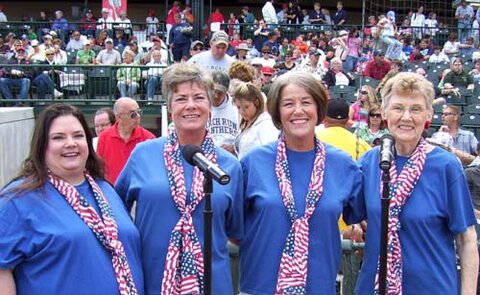(Editor's Note: This commentary was originally published July 4, 2007.)
July 4 is usually commemorated with tunes by John Philip Sousa and songs by George M. Cohan. Popular music stations, however, take a different tack by digging out songs each year that use Independence Day as a metaphor for personal catharsis. While many songs retain a sense of patriotism for the birth of our country, others are a bit more critical. Far from being antithetical to the spirit of our national holiday, however, all of these songs celebrate the guaranteed artistic freedoms of the United States.
Every July 4, classic rock radio listeners hear a passel of Bruce Springsteen songs. "Independence Day," from his 1980 album "The River," is a song about a young man resolved to ending the arguing between himself and his father. The young man narrates the song and relates, "There was just no way this house could hold the two of us/I guess that we were just too much of the same kind." Despite the differences between father and son, the son acknowledges that he and his father share some views: "Because there’s just different people coming down here now/and they see things in different ways/And soon everything we know will just be swept away." The point of the song is that external forces may exacerbate the "darkness of this house," but that, inevitably, the human spirit longs for freedom from oppression, whether paternal or economic.
Similarly, Dave Alvin’s "Fourth of July," which has been recorded by the band X, Robert Earl Keen and by Alvin himself on the album "King of California," is a song about an unhappy relationship between the narrator and his female partner. The woman "cries in the dark" and the narrator is frustrated when "She gives me her cheek when I want her lips." Neither seems capable of leaving the other, and the narrator resolves to end the stalemate in their relationship by committing to celebrate: "Whatever happened, I apologize/So dry your tears and baby, walk outside/It’s the Fourth of July." In this instance, the Fourth of July is used as a means to express freedom by showing how the individual can take control of his or her own life to ensure personal happiness.
James Taylor’s "On the Fourth of July" — from the 2002 album "October Road" — similarly relates the story of a relationship between "unbelievable you, impossible me/The fool that fell out of the family tree." More than a hint of wistfulness is apparent in the following lines that speak for themselves: "With a tear in your eye for the Fourth of July/For the patriots and the minutemen/And the things you believe they believed in then/Such as freedom, and freedom’s land/And the kingdom of God and the rights of man." Whether Taylor’s listeners may hear a straightforward rendering of the sentiments or a trace of cynicism, the lyrics still express the ideals that shaped this country and continue to guide it to this very day.
Country music fans were shocked when Martina McBride released her "Independence Day" single — written by Gretchen Peters — in 1993. The song relates the violent response of a female victim of domestic violence from the point of view of her 8-year-old daughter. Physically abused for years, the mother retaliates by setting the family home on fire, killing her husband and the daughter’s father on July 4. The mother also presumably dies in the fire, as listeners are told that the daughter is sent to live in a county home. The daughter refuses to determine whether her mother’s actions were right or wrong, but that is more or less the point of the song. As critic and music writer Thom Jurek wrote, the song "asks real questions about what ‘independence’ actually means." Jurek goes on to say: "Set on the Fourth of July, it pointedly asks, Does Independence Day mean independence for everyone or does it mean making the choice to free yourself from your bonds, no matter how horrific the consequences? Is it a choice made independent of society, morals, and cultural and religious mores because of the depth of one’s convictions?"
In other words, freedom requires consistent examination to ensure that the word doesn’t become just another bumper sticker word devoid of real meaning, but instead the philosophical basis guiding both our country and our individual actions.
#####
Bruce Edward Walker is science editor at the Mackinac Center for Public Policy, a research and educational institute headquartered in Midland, Mich. Permission to reprint in whole or in part is hereby granted, provided that the author and the Center are properly cited.
Click here to watch LeAnn Hadley, administrative assistant at the Mackinac Center for Public Policy, perform “The Star-Spangled Banner” on July 1, 2007, at the Great Lakes Loons minor league baseball game in Midland. Hadley, far left, performs with the T.C. Chicks, a quartet with the Tri-City Chorus of Sweet Adelines International.

LeAnn Hadley (tenor), Shirley Clemens (lead),
Mary Garcia (bass) and Ara Dammer (baritone).

The Mackinac Center for Public Policy is a nonprofit research and educational institute that advances the principles of free markets and limited government. Through our research and education programs, we challenge government overreach and advocate for a free-market approach to public policy that frees people to realize their potential and dreams.
Please consider contributing to our work to advance a freer and more prosperous state.